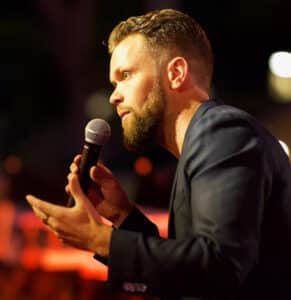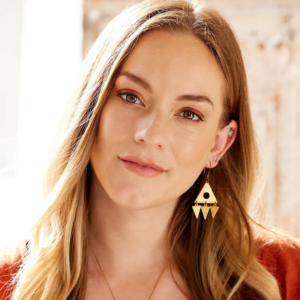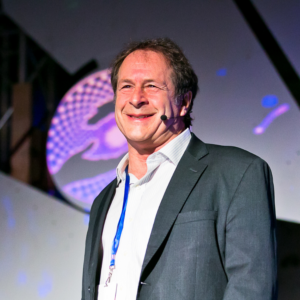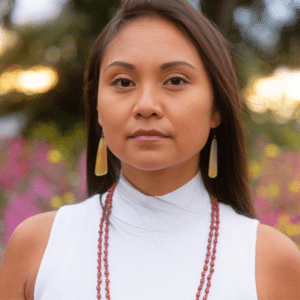(Bonus Episode) Keynote by Paul F. Austin at “Psychedelic Horizons” in San Diego
LISTEN ON:
Episode 249B
Paul F. Austin
In this bonus episode, we bring you a keynote speech by Third Wave founder Paul F. Austin, recorded live on May 16, 2024 at the Psychedelic Horizons: Crafting Resilient Futures Through Conscious Entrepreneurship event in San Diego.
To join an upcoming gathering in the Psychedelic Horizons Event Series, Click Here.
Paul explores going beyond resilience to inspired living and systems change, highlighting the role of conscious entrepreneurship in driving systemic transformation. He delves into the convergence of psychedelics, global systems, and entrepreneurship, offering insights for entrepreneurs, investors, and practitioners alike. Aligning with the event’s theme, Paul offers an invitation to channel visionary creativity towards a future rooted in collaboration and mycelial wisdom.
Magnesium Breakthrough by BIOptimizers is the only full-spectrum magnesium supplement with 7 unique forms of magnesium that your body can actually use and absorb. And, yes, you need all 7 forms. Visit bioptimizers.com/thirdwave now and use promo code thirdwave for 10% off any order.
Podcast Transcript
Paul F. Austin: Welcome to The Psychedelic Bodcast by Third Wave, audio mycelium connecting you to the luminaries and thought leaders of the psychedelic renaissance. We bring you illuminating conversations with scientists, therapists, entrepreneurs, coaches, doctors and shamanic practitioners exploring how we can best use psychedelic medicine to accelerate personal healing, peak performance and collective transformation.
[Music]
Have you been struggling with mood swings? Like getting really irritated by the simplest things, maybe work related things day to day things, relational things. Or maybe you feel like your hormones could be out of whack like you other than sleeping while you've been stressing out craving foods that you're not used to craving, or even your skin, your hair and even your muscles, they feel different.
Let's talk about a game changing mineral that can help you feel your best. Magnesium. Magnesium is an absolute must for keeping your hormones balanced and your body functioning optimally. But here's the thing Most of us aren't getting nearly enough from our diets alone. And when you're deficient in this vital mineral, it could throw your entire system out of sync.
In addition to hundreds of chemical reactions, magnesium also plays a vital role in hormonal balance glucose metabolism and managing symptoms across different stages of life. This makes magnesium supplementation a great support option for all ages. That's why I'm excited to tell you about Magnesium Breakthrough from BiOptimizers. This unique formula contains seven different forms of highly bioavailable magnesium, including magnesium rotate, which is amazing for metabolic and hormonal health.
It can also support hormonal health by supporting sleep, digestive health and stress management. Nourish your brain and body with magnesium Breakthrough now. Visit bioptimizers.com/thirdwave and use the promo code thirdwave for 10% off any order that's bioptimizers.com/thirdwave, promo code thirdwave. Your body and brain will thank you.
Paul F. Austin: Welcome back to The Psychedelic Podcast by Third Wave, connecting you to leaders and pioneers of the psychedelic renaissance. This is your host, Paul F. Austin, and today's episode is a bonus episode. It's a keynote from our inaugural event in the Psychedelic Horizons event series, a keynote that I gave around going beyond resilience, inspired living, and systems change.
We invited entrepreneurs, investors, practitioners, those who are looking to transition into a career in the psychedelic space for an evening of discussion connection as we explored the convergence of psychedelics, global systems, and entrepreneurship. And with psychedelics on the verge of legalization, people around the world are waking up to their deepest potential and purpose.
We live in an explosion of visionary creativity and human potential never seen in history. How can we best channel this creative energy towards a future beyond resilience, rooted in the mycelial wisdom of decentralization and collaboration? Conscious entrepreneurship offers a powerful vehicle to benefit clients and customers and drive systemic change itself.
This is a live keynote. It's about a 25 to 30 minute talk. We also have two more events coming up June 5th in Mill Valley in the San Francisco Bay area, and on June 10th in Malibu. If you're interested in attending either of those vents, come to our page, send us an email. There will also be links in the show notes.
You can just go to this bonus episode on the website and you can get your tickets there and we have 50 tickets available for each event. So without further ado. Here is the bonus episode, and I do hope you enjoy it. Give a big energizing and warm welcome to Paul Austin.
Thank you. Thank you, Pablo. How y'all doing? Magical. Everything about this is magical. It's an honor to be here. It's an honor to, to facilitate with Pablo. Let's give it up for Pablo, by the way, for, for everything he's done and he's doing. And when we were ideating about the intention of the evening, this, this phrase, psychedelic horizons, felt very, very relevant, very prominent.
We're sitting at a moment in time where the FDA is on the verge of approving. MDMA for PTSD. Oregon and Colorado have legalized psychedelic plant medicines, and over, I think, 60 percent of Americans now support legal psychedelic assisted psychotherapy. And for those who have been around the space for some time there's a deep understanding that the work is just beginning, right?
And so the intention of coming together tonight is to explore how do we craft a resilient future, specifically through conscious entrepreneurship. How many of you are entrepreneurs in some way, shape, or form? I would imagine the vast majority of you. How many of you have had your lives dramatically impacted by psychedelics in a positive way?
Great. So I'm speaking to the right crowd. Fantastic thing. So my, my story starts at the age of 16. I grew up in a pretty traditional environment in a little suburb of Grand Rapids called Grandville and everything, everything was quite grand. If you were religious and followed the rules and you know, did what you were supposed to do.
And as you can imagine, that wasn't, I didn't qualify for for that. And at the age of 16, my parents found out that I had been smoking cannabis, that I had been experimenting with cannabis. And they sat me down one Sunday after church, and my dad looked at me, and I have a very close relationship with my parents, a very loving relationship with my parents, but my dad looked at me and he said, you know, I haven't been this disappointed since my brother passed away in a car accident 30 years ago.
So imagine, you know, I'm a 16 year old kid, and I just. I had a really fun experience with cannabis, it was really interesting, and here I am being told that this experience is something to be ashamed of, it's something to be guilty of, and, I was traumatized from that experience, it was, it was, it was really hard to, to swallow that and yet, at the same time, I knew that, that experience that I had had with cannabis was insightful, it was illuminating, it was interesting, And there was something there that I wanted to go deeper into.
And so, a few years later, at the age of 19, I had the opportunity to work with psychedelics. First, Psilocybin Mushrooms, and then LSD. And it was a beautiful May day when I had my first really mystical and magical experience with, with LSD, in the woods of West Michigan. And the, the deep feeling, the deep feeling was one of incredible reverence, respect and love for the natural environment, right? For nature and all of her beauty and glory and all. There was a deep sense that I was her, she was me. There was no disconnection. There was no separation between myself and the world that we live in, the natural environment that we live in.
And so from that experience, the teaching or the lesson was one of connection, but also freedom and sovereignty more than anything. And what I came away from that experience with a, with a deep devotion to was if I could spend my time and energy on one thing, it would be to help restore our right relationship with nature, right?
And that if we could, open up, the aperture of our consciousness to connect with nature in a deep way and look I'm wearing a suit jacket I don't really identify as a hippie in any stretch of the imagination. And yeah, I had these deep deep desire to take care of The natural environment and so for the the topic of the night crafting resilient futures What I mentioned in the description is I talked about three things Resilience?
And we'll even say beyond resilience. What, what is beyond resilience? The, the sort of intellectual phrase is anti fragility, but no one knows what the fuck that is, so I, I, I left that out. So beyond resilience, how do we go beyond resilience? Inspired living, what inspires us? To pursue our Dharma, to pursue our path, to, to really follow the, the sort of a voice inside of inside of us that is on a mission, a devotion, a commitment, a purpose.
And then the, the final one is systemic change, right? When we're looking at the systems that we exist within, how is it that we can change those systems? How is it that we can impact those systems? So a few years after I did LSD, I was again doing LSD in Budapest. I was 24 with a couple of friends and this was 2015.
And Clayton who's in the back, Clayton, raise your hand. Clayton and I were hanging out in Budapest at that point in time. Had a ton of fun. And one of those experiences In that experience, I was inspired to take that initial knowledge that had been sort of opened up at the age of 19 and actually start to integrate it into my professional vocation and my professional path.
And that's where the third wave came from. And the idea of the third wave of psychedelics is that our relationship with psychedelics is nothing new. That we've had a deep relationship with these medicines for thousands of years. And that in coming out of that relationship, there seems to be a deep harm or a deep challenge that we are confronted with.
And so if we can help to reestablish, again, like indigenous and ancient communities have done for thousands of years, reestablish our relationship to nature using psychedelics, then that might offer a glimpse of a future that is more beautiful that we want to live in. So the idea with the third wave of psychedelics is they had been around for thousands of years. We had attempted to bring it back into our consciousness in the second wave of psychedelics the 50s and 60s. We had failed but we had failed falling forward, which is a sort of cliche entrepreneurial phrase. We fail falling forward.
So we had failed as a culture falling forward and now In 2024, there's all of a sudden an opportunity to right that ship, and to root a lot of our understanding of these medicines in wisdom. In preparing for this talk, I was reading through a number of quotes and, and one that stuck out to me in particular was from E. O. Wilson. How many of you have heard of E. O. Wilson? A few of you. So E. O., one of, one of his favorite quotes is that we are overwhelmed with information and starving for wisdom and that the synthesizers of information, those who can discern between them. What is true and what is not, what is the signal compared to what is the noise, these individuals will help to communicate the way forward.
E. O. Wilson also said that we have paleolithic emotions, medieval institutions, and god like technology. And so in the face of AI and artificial intelligence, in the face of this rapid acceleration of technology, there's this synchronicity or this intuitive way in which psychedelics are re entering our consciousness to teach us the importance of slowing down and being with.
So this third wave of psychedelics is really about the middle way. How do we find that middle way between the ancient and indigenous use, and the more modern cutting edge science and objectivity and these sorts of things?
So when we look at the scientific evidence of psychedelics for going beyond resilience, one of the I would say most well established effects of psychedelics is their impact on neuroplasticity. They catalyze BDNF production, brain derived neurotrophic factor, which is a precursor to neuroplasticity, they make behavioral change way easier.
We all experience this in the afterglow of a high dose therapeutic experience. We probably experiences when we microdose. It keeps up in that critical learning period for even longer. And so when we look at becoming anti fragile going beyond resilience. A key aspect of that is adaptability. How do we adapt?
As the external world gets faster, how do we adapt? How do we slow down? How do we go internal? The second aspect inspired living. The ancient Greeks had this phrase that to die before you die means that you don't die when you die. I'll say that again. To die before you die means you don't die when you die.
And this was inscripted in the temples, in the halls where they participated in the Eleusinian Mysteries. where they drank kykeon, a beverage that was made of ergot, the same thing that LSD is made from. And so the wisdom in psychedelics, especially at these high dose therapeutic experiences, is that I am not I.
I am not only I. I am I, but I am way beyond just the I. And that understanding, that deep knowledge, that death is an illusion, often allows for a more inspired way of thinking. to live. There's a courage that has opened up where we can no longer ignore the Dharma that we have been brought here to follow.
And so that courage and inspired way of living is what, I mean, all of you, so many of you, it's the reason you're here tonight. It's the, it's, it's why you've been so impacted by psychedelics. And many of you already are on that path or you're seeking that path. What wants to emerge? What wants to come through?
Where does this wisdom want to guide me? And the third one, systems change, systemic change. Ken Wilber, how many of you have heard of Ken Wilber? You know of Ken Wilber, a philosopher who has written extensively. He wrote a book called The Religion of Tomorrow in 2016. And in that book, he outlined this pathway.
that we were following as a culture of spirituality and how spirituality will transform our systems, according to him. And the reference that he made, the parallel that he drew, was with the printing press in the Renaissance, that when the printing press came out in the mid 15th century, it catalyzed an intellectual movement of literacy.
And it wasn't that everyone immediately learned how to read and write. Many centuries for that to happen, but that about 10 percent of people in the renaissance Developed the capacity to read and write because of the invention of the printing press and they went on to develop the whole entire university system to be merchants to develop the industrial system as we know it today, which has then created I mean today what 99 100 percent of people are literate in Western countries. What if psychedelics did that for consciousness, the way the printing press did that for literacy?
And the fact that everyone has to have this mystical experience, this sense of ego death, that would probably be more harmful than helpful. In fact, Terence McKenna was speaking at Esalen in the 80s and Ralph Metzner, Ralph was an OG psychologist who was friends with Timothy Leary and Ram Dass in the 60s at Harvard.
Ralph raised his hand and asked a question and said, do you think? Everyone needs to take psychedelics in order for culture itself to change and Terence said I don't think so. It's just the five to ten percent of people who are hardcore psychonauts. They need to do the work. They need to be devoted to exploring the inner antipodes of their consciousness.
And in doing that work, in developing, thank you, John. Thank you, John. In developing that internal landscape, that richness that comes from the inner knowing, the inner depth, that creates a space to understand how can we build new systems that are rooted in what I call the truth of interconnectedness? That we can no longer accept that we are separate from the thing outside of us, that we are entangled with it, that we are deeply connected to.
So beyond resilience, adaptability, inspired living, courage, ego dissolution, and systems change. The hardcore psychonauts, and I'm looking at a lot of them in this room, how do we do that deep inner work so we can bring that magic out into the world around us? In whatever way that looks. And whatever our path asks us to follow.
Aldous Huxley. Probably everyone here has heard of Aldous Huxley. Best known for writing Brave New World in 1933. A dystopian novel. How many of you have read Brave New World? A dystopian novel in 1933. Really criticizing the, what Huxley would call, the onward march of the machine. It was a very, critical take on where culture and society was at that point in time.
That pessimism, as you can imagine, only was amplified and strengthened with World War II, when it broke out in 1939, and then from 1939 to 1945. And so Huxley, I would say the foremost intellectual of the 20th century, was left grasping for answers. He went through his own spiritual process. He studied Vedanta, nonduality, and in grasping for a sense of what is going on, the world is falling apart as we know it.
And so many of us experience that today, and it's nothing like what was happening 70, 80 years ago. For him, it wasn't a matter of giving up. It wasn't a matter of saying the world is fucked, so forget about it. He continued to explore his own consciousness. And so in 1953, he was offered mescaline, which is typically in San Pedro, Peyote.
He had this experience with psychedelic. Wrote a book called The Doors of Perception, which is where The Doors get their name from.
Soon after these psychedelic experiences, he wrote his final book called Island. And Island was the exact. opposite of Brave New World. It was a novel, a story about a utopian society called Pala that was in the, the West Indies. An island that was isolated from the rest of the world and that was doing its best to maintain its isolation to protect the purity of its culture.
And he wrote that book as a blueprint, as a roadmap. It was his final gift before he died. He died in 1963, the same day as JFK and C.S. Lewis, in fact. And what's also a fun little fact is he had his wife inject him with LSD as he died, which is exactly what I want.
So this was his final gift, right? And so you think in the face of World War II, right? This man who had been so pessimistic and cynical, why didn't he just give up? There was an awakening. There was a sense of antifragility. He was inspired through both Vedanta, but also his psychedelic work to write one last book that would provide that blueprint that I think is very, very relevant for today.
Because when we talk about system change, even when we're in this venue, this beautiful, incredible, amazing, magical, I mean, I could keep going with superlatives. Many of us have a friend or two or three or ten who have talked about communal living, who have talked about going to Costa Rica, who have even set up a place maybe in Todos Santos, you know, or British Columbia or Portugal.
There's something in the water, not literally, but there's something in the water that seems to be inspiring a new way to think. Tim Ferriss is sort of the godfather of lifestyle design, individual lifestyle design. How can I experience as much freedom as possible? And we're at this precipice now, where we're focusing more and more on collective lifestyle design.
And so the polarity that I was talking through, Leanne and Veena, when we were preparing for this talk, is Elon Musk and this place called Brave Earth where we do our intensives for our practitioner training program. Elon Musk has a massive vision. He is mission focused. He's the wealthiest man in the world.
He's incredibly controversial. Some would say also incredibly traumatized. But he get he cares deeply about his mission to the point where the patent for Tesla, the battery, he didn't patent it. He said, I want this to be open source because the overall momentum of renewable cars is more important than just individual shareholder value.
Massive vision. And he's found his role. He's found his Dharma. He really cares about this regenerative movement. There's critiques of course. And there's. A lot of fucked up shit, but he cares, big fishy. Brave Earth is a center in Costa Rica, it's 88 acres, they call it a living laboratory, a center for applied cultural transition, started by two brothers.
It's local, there's no more than 27 people who are on the board, no more than 80 people who will live there, they grow all their own food, they do medicine work, deep medicine work with ayahuasca and psilocybin there. And the intention is to create a laboratory, a blueprint, much like Huxley's Island for new ways in which we can live.
There's not a big vision, it's very grounded, it's very localized, but the heart is still there. So when we look at that polarity, my question is, one, where do you fall off? What resonates for you about those stories?
And two, how do we develop systems that are contextual, that allow for everyone to follow this path of: Who they want to be, of where they want to go, influenced and informed by psychedelics? Okay, the final thing that I want to talk about is ayahuasca. And AI. So ayahuasca versus AI.
Ayahuasca is a rooting. How many of you have worked with ayahuasca at some point? The mother medicine, right? Deep medicine, healing medicine, ancient medicine. There's something that happens when we work with ayahuasca that puts us back in touch with this primordial sense of self, this archaic sense of self.
It's very human, and it's also not at all. Mm-Hmm? , right? It's an intelligence. Just like artificial intelligence, it's an intelligence, it's a plant intelligence, it's an ancient intelligence. And that relationship, that symbiosis, with ayahuasca as an intelligence has been so healing for so many.
Artificial intelligence. There's a lot of concerns, there's a lot of fear, and yet we're here.
It can be an ally, if we choose to look at it as an ally. Ayahuasca is much more of a first wave. Intelligence. AI is much more of a fourth wave intelligence. And so what's the middle wave? How do we maintain our humanness while still relying on these allies?
Technology. God like technology, right? Back to that E. O. Wilson quote. We have Paleolithic emotions, Medieval institutions, and God like technology. How might ayahuasca, how might psychedelics help us to navigate that?
Okay. Final closing and then we'll, we'll move into the panel. I mentioned the story, you know, when I was 16, my dad looked at me, ashamed, couldn't believe it. Incredibly disappointed.
I cared, but not enough to stop what I was doing. Got into psychedelics, started Third Wave. In 2015, started a legal psilocybin center in the Netherlands, Synthesis, in 2018. And, you know, just every now and then would send my parents things that were happening. My parents are, my dad's never been drunk. They definitely have never smoked weed, obviously.
There, there are people who go to church every Sunday. They're teetotalers in many ways.
Because I kept showing up, because I was following that path, you know, and because of the trust and the love that I have with my dad, in 2018 I sent him Michael Pollan's book to read, How to Change Your Mind, and he started to microdose. And then in 2019, I was visiting my parents in Grandville, and I guided my dad through a high dose psilocybin journey.
Basically the only time he's ever done any drug whatsoever. And it was meaningful. Wasn't life changing. It was meaningful. It was impactful. And so when we talk about or think about systems change, when we as entrepreneurs think about vision and big picture, we often get caught in the big picture and we forget that so much of transformation happens in the little moments, it happens in our family.
It happens with our friends. It happens when we show up, and we know without a shadow of a doubt that we are living the life that we are meant to live and we are doing it with love and we are doing it with purpose and we are doing it with devotion. We're doing it with commitment and that, that heart
is what transforms us as individuals. And I also trust that it's what will transform the systems that we live in. That heart that loving, beating, beautiful, magical heart.
Being with that, settling into that, honoring that, will lead the path forward. Thank you
[Music]




